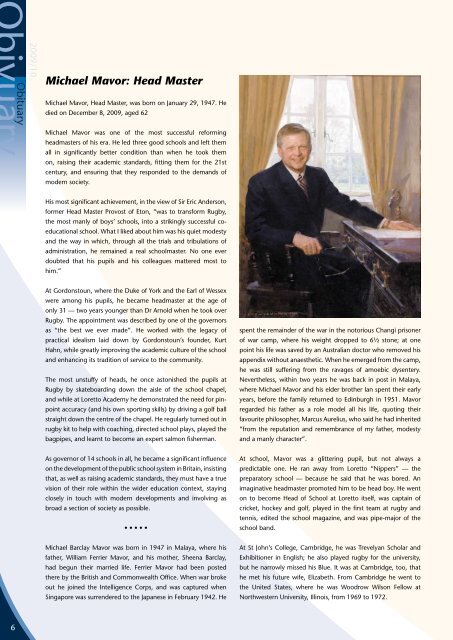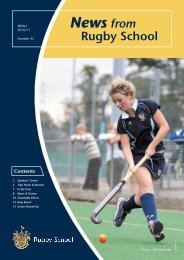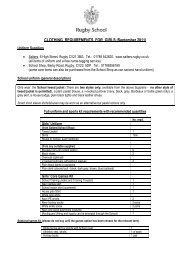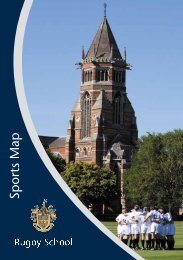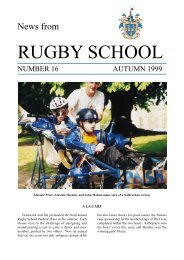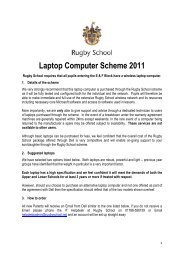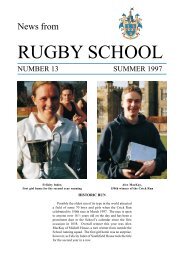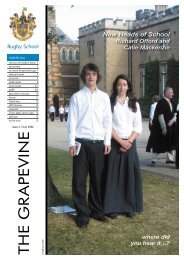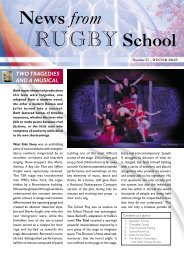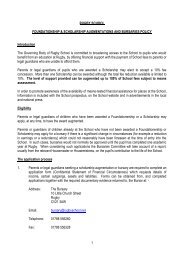Sport - Rugby School
Sport - Rugby School
Sport - Rugby School
Create successful ePaper yourself
Turn your PDF publications into a flip-book with our unique Google optimized e-Paper software.
Obituary<br />
2009/10<br />
Michael Mavor: Head Master<br />
Michael Mavor, Head Master, was born on January 29, 1947. He<br />
died on December 8, 2009, aged 62<br />
Michael Mavor was one of the most successful reforming<br />
headmasters of his era. He led three good schools and left them<br />
all in significantly better condition than when he took them<br />
on, raising their academic standards, fitting them for the 21st<br />
century, and ensuring that they responded to the demands of<br />
modern society.<br />
His most significant achievement, in the view of Sir Eric Anderson,<br />
former Head Master Provost of Eton, “was to transform <strong>Rugby</strong>,<br />
the most manly of boys’ schools, into a strikingly successful coeducational<br />
school. What I liked about him was his quiet modesty<br />
and the way in which, through all the trials and tribulations of<br />
administration, he remained a real schoolmaster. No one ever<br />
doubted that his pupils and his colleagues mattered most to<br />
him.”<br />
At Gordonstoun, where the Duke of York and the Earl of Wessex<br />
were among his pupils, he became headmaster at the age of<br />
only 31 — two years younger than Dr Arnold when he took over<br />
<strong>Rugby</strong>. The appointment was described by one of the governors<br />
as “the best we ever made”. He worked with the legacy of<br />
practical idealism laid down by Gordonstoun’s founder, Kurt<br />
Hahn, while greatly improving the academic culture of the school<br />
and enhancing its tradition of service to the community.<br />
The most unstuffy of heads, he once astonished the pupils at<br />
<strong>Rugby</strong> by skateboarding down the aisle of the school chapel,<br />
and while at Loretto Academy he demonstrated the need for pinpoint<br />
accuracy (and his own sporting skills) by driving a golf ball<br />
straight down the centre of the chapel. He regularly turned out in<br />
rugby kit to help with coaching, directed school plays, played the<br />
bagpipes, and learnt to become an expert salmon fisherman.<br />
spent the remainder of the war in the notorious Changi prisoner<br />
of war camp, where his weight dropped to 6½ stone; at one<br />
point his life was saved by an Australian doctor who removed his<br />
appendix without anaesthetic. When he emerged from the camp,<br />
he was still suffering from the ravages of amoebic dysentery.<br />
Nevertheless, within two years he was back in post in Malaya,<br />
where Michael Mavor and his elder brother Ian spent their early<br />
years, before the family returned to Edinburgh in 1951. Mavor<br />
regarded his father as a role model all his life, quoting their<br />
favourite philosopher, Marcus Aurelius, who said he had inherited<br />
“from the reputation and remembrance of my father, modesty<br />
and a manly character”.<br />
As governor of 14 schools in all, he became a significant influence<br />
on the development of the public school system in Britain, insisting<br />
that, as well as raising academic standards, they must have a true<br />
vision of their role within the wider education context, staying<br />
closely in touch with modern developments and involving as<br />
broad a section of society as possible.<br />
• • • • •<br />
At school, Mavor was a glittering pupil, but not always a<br />
predictable one. He ran away from Loretto “Nippers” — the<br />
preparatory school — because he said that he was bored. An<br />
imaginative headmaster promoted him to be head boy. He went<br />
on to become Head of <strong>School</strong> at Loretto itself, was captain of<br />
cricket, hockey and golf, played in the first team at rugby and<br />
tennis, edited the school magazine, and was pipe-major of the<br />
school band.<br />
Michael Barclay Mavor was born in 1947 in Malaya, where his<br />
father, William Ferrier Mavor, and his mother, Sheena Barclay,<br />
had begun their married life. Ferrier Mavor had been posted<br />
there by the British and Commonwealth Office. When war broke<br />
out he joined the Intelligence Corps, and was captured when<br />
Singapore was surrendered to the Japanese in February 1942. He<br />
At St John’s College, Cambridge, he was Trevelyan Scholar and<br />
Exhibitioner in English; he also played rugby for the university,<br />
but he narrowly missed his Blue. It was at Cambridge, too, that<br />
he met his future wife, Elizabeth. From Cambridge he went to<br />
the United States, where he was Woodrow Wilson Fellow at<br />
Northwestern University, Illinois, from 1969 to 1972.


